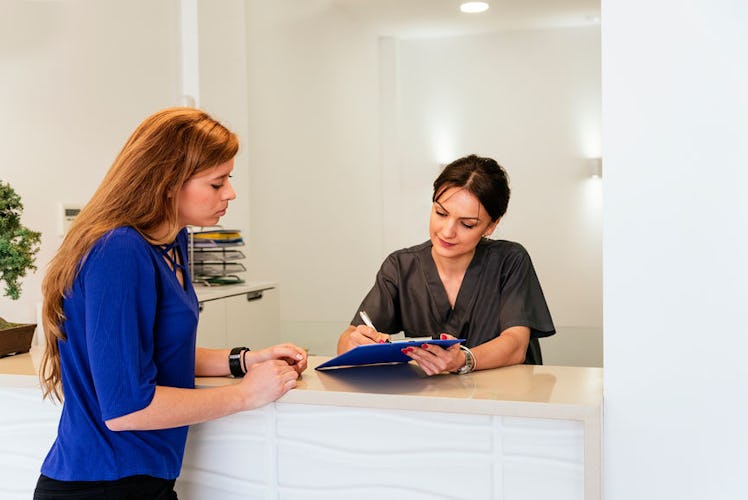
4 Totally Normal Things That Happen When You Get Tested For STDs, So You're Not Surprised
Going in for STD testing can feel really scary if you've never done it before, but there's nothing actually scary about getting tested. It is such an important part of maintaining your regular sexual health, because ignorance isn't bliss when it comes to your body. If you don't really know what to expect, knowing some of the normal things that happen when you get tested for STDs may help ease the anxiety you may feel. Honestly? It's really NBD.
"You don’t know if there is a problem unless you screen for it!" Dr. Sheila Loanzon, obstetrician and gynecologist, tells Elite Daily. "Majority of the STD testing done is negative, however you won’t give yourself the peace of mind and reassurance of negative testing unless testing is completed. Often STD symptoms may be silent or asymptomatic, so don’t let an opportunity pass you by. It is better to know and get treated than to miss out on an opportunity to be ahead of your health." Taking the fact that most testing comes out negative into consideration should be somewhat comforting. But you won't know for sure if it applies to you unless you keep your fears from taking over and do it.
"There are several ways that a patient can be tested for STDs," Dr. Loanzon says. "Generally, a lab order can be given to test blood for HIV, syphilis, hepatitis B and C. To check for gonorrhea and chlamydia, an option may be to give a urine sample (read: no need to be seen in the office) versus a speculum exam in the vagina to obtain a cervical swab for a culture."
Now that you have a general understanding of what to expect when you go in for STD testing, here's a breakdown of what your STD screening process might look like.
01Your provider will assess the risk factors.
Before even beginning the STD testing, your provider is going to ask you a few questions about your sex life to see if you're at risk of a possible STD. "Some risk factors may be a new sex partner in the past 60 days, multiple sex partners, inconsistent condom use, trading sex for money or drugs, sexual contact with sex workers — as well as risk factors such as age, history of prior STD, illicit drug use, and several other risks," Dr. Loanzon says.
02If you decide to have a vaginal cervical screening, your provider will swab your cervix.
To screen for some STDs, you just need to get blood drawn, but for others you may need to have a cervical screening. "A speculum will be inserted inside the vagina and the swab placed inside the cervix," Dr. Loanzon explains. "The swab itself does not cause any pain, [though] some patients note discomfort when a speculum is inserted." So, keep that in mind if you decide you want to get a vaginal cervical screening for gonorrhea or chlamydia. Dr. Loanzon recommends getting tested for both of those annually if you're under 25 years old.
Once the swabbing is done, "the sample is sent off to the laboratory," she says. "The clinician may or may not do a pelvic exam to confirm there is no evidence of pelvic inflammatory disease," and then you're done with that part.
03You will get your blood drawn.
If you decide to forgo the cervical screening, you'll be sent to the lab to get your blood drawn for HIV, syphilis, hepatitis B, and C. After this, your STD testing is done!
04You should have your results back in 24-48 hours.
Now that the actual testing is done, it's time to wait. When your provider gets the results, they "may choose to have you return to the office for your results, have someone from the office contact you, or complete another form of contact," Dr. Loanzon explains. "If a test result is positive, this result is reported to you, as well as the public health office in your community to track these infections to ensure the infection does not become a rampant public health epidemic."
While a lot of a STDs are included in routine blood testing or in cervical screenings, herpes isn't. Dr. Loanzan says, "It is important to speak to your health care provider if you believe you should have testing" for that particular STD.
If you're still nervous even after knowing what to expect, "it is helpful to know what aspect of testing is anxiety-inducing: Is it the blood draw, treatments for STDs, stigma or fear in your partner?" Dr. Loanzon asks. "Understanding what causes the issue for you may help you focus on how to ease your mind." It can also help to get tested with a friend or with your partner. "Don’t let the STD or STD testing have power over you, getting the screening done puts power back in your hands."
This article was originally published on